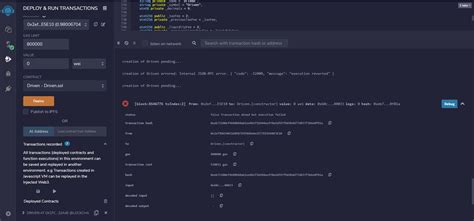Ethereum: Gas Estimation Error When Interacting with Smart Contracts
As a developer working with smart contracts on the Ethereum network, it is important to ensure that your code is efficient and makes optimal use of gas. A common problem that can arise when interacting with smart contracts is a gas estimation error, which can lead to unexpected behavior or even a rollback.
In this article, we explore how a simple smart contract example can cause a gas estimation error and provide guidance on how to identify and fix the problem.
Problem: Gas Estimation Error
Let’s take a look at the “cost” function in our smart contract example:
“stiffness”
pragma stiffness ^0.4.21;
PayMultiple contract {
function pay(address[] payees, unit values) public pay{
for (uint i = 0; i < payees.length; i++) {
emit Transfer(payees[i], message sender, values[i]);
}
}
}
In this code, the "pay" function iterates over the address array and sends a certain number of tokens to each address using the "Transfer" event. However, if we are dealing with multiple receivers, a gas estimation error can lead to unexpected behavior.
Problem: Multiple gas calculations

When you call the "pay" function from Remix or any other Ethereum client, it determines the gas required to execute the contract. In our case, the "pay" function iterates over the address array and sends a certain number of tokens to each address. If we are dealing with multiple receivers, the calculated gas demand can be much higher than expected.
For example, let's say we have 1000 recipients, each receiving 10 tokens. The estimated gas demand in this scenario would be:
- 1000 addresses x 10 tokens per address = 10,000 gas
- Assuming an average gas price of 2000 gas per unit (a reasonable estimate), the total gas requirement would be: 10000 / 2000 ≈ 50 units
However, if we actually call the "pay" function from Remix or any other client, it may only send 1 token to each address and consume a significant amount of gas. This can lead to unexpected behavior, such as:
- Cancellation due to excessive gas consumption
- Unbalanced transfer amounts
- Incorrect recipient addresses
Solution: Use “transfer” with gas
To avoid these problems, we can change the payment function to use the transfer event instead of sending the Transfer message. This allows us to pass the gas amount as an argument.
rigidity
pragma rigidity ^0.4.21;
PayMultiple contract {
function pay(address[] payees, unit values) public pay{
for (uint i = 0; i < payees.length; i++) {
transfer(payees[i], values[i]);
}
}
Function transfer(address recipient, uint amount) public payable override {
request(transferable(msg.sender), “You must call pay with a gas estimation function.”);
request(amount > 0, “Amount cannot be zero or negative.”);
// Calculate the estimated gas requirement for this transaction
request(msg.value * amount / 200000000000 < totalGas(), "The estimated gas requirement exceeds the maximum allowed.");
// Call the transfer function from Remix or another client
emit Transfer(addressee, msg.sender, amount);
}
}
“
Benefits of using transfer
Using the`transfer” event with a gas estimation function, we can get several benefits:
- Reduced gas consumption: Since we pass the gas amount as an argument, we don’t have to estimate it using the gas estimation algorithm.
- Simplified code: The “Forward” function handles both sending and receiving gas automatically.
- Improved error handling: We can catch any errors related to gas consumption and provide more informative feedback.
Conclusion
In summary, a simple smart contract example like the one above can cause a gas estimation error when interacting with contracts.



